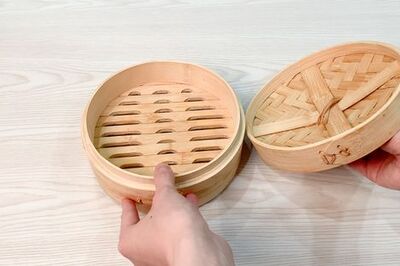
views
Adding a One-Point Overbustle

Sew a loop. Place a safety pin on the back of the dress, halfway up the length of the bride's train. This is where the loop will go. Thread the needle by doubling up the thread and inserting it into the needle. Tie the end of the thread with a knot to secure it. Insert the needle into the underside of the dress. Pull the thread all the way through. Make a small stitch and pull the thread most the way through to create a loop. Grab the loop with your fingers and pull the remaining thread through the loop to create a knot. Repeat this process until you have a loop big enough to fit your button. Secure the loop by running the needle and thread through the loop to tie it off. Insert the needle through the fabric to the other side and make two knots. Cut off any excess thread.

Attach the button. Place a safety pin on the back of the dress, a foot above the bride's knees. This is where the button will go. Thread the needle and make a knot at the end of the thread. Thread the needle through the underside of the dress. Attach the button to the dress using the needle and thread. Stitch the button four times to make sure it is secure. Secure the button by running the needle and thread through the fabric to the other side. Make two knots and cut off any excess thread. If you prefer, you can also sew the button onto the waist of the dress and the loop onto the train.

Bustle the dress. Hook the loop over the button to lift the dress's train off of the floor. Rearrange the folds of fabric around the bustle to make the bustle appear bigger and to give it more volume. The one-point overbustle is the least expensive way to bustle a dress, but it's also the least secure. The one point overbustle is only recommended for dresses with lighter fabric. Do not try the over bustle if your dress is heavy or has a particularly long train.
Adding a French Bustle

Measure the seam. To add a French bustle, start by measuring the center back seam of the gown's train from the waist to the floor. Then measure the distance from the edge of the train to the base of the dress. Mark the place between these two distances with a pin.

Pin the waistline seam and train. Lift the center back seam where you made the pin mark and position it against the center of the waistline, at the base of the bodice. Adjust the fold so the train is between ½” to ¾” (1.3 – 2 cm) off the floor. Pin the train to the waistline seam. Lift the sides of the train off the floor ½” to ¾” (1.3 – 2 cm) and fold and pin the train along each side of the back seam. To lift the remaining train off the floor, continue to fold and pin the train as necessary between the seams.

Make the ties. Undo all the pin-marking points you have made on the train and waistline of the dress. Sew a length of narrow grosgrain ribbon measuring 15” (38 cm) to the waistline of the dress, using the pin marks as a guide. The ribbon should fall between the lining of the skirt and the dress's train. Make sure to sew the ribbon securely into the waistline seam.

Make the loops. Cut 2 1/2“ (6.5 cm) of the ribbon before folding it in half and stitching the ribbon loop to the underside of the dress's train. Make the loop stronger by reinforcing it with a small piece of interfacing, or by attaching the loop to the seam allowances of the dress. Loops should be attached ½” (1.3 cm) below each pin mark. Repeat the same process for all other loops.

Bustle the dress. Attach each ribbon to the corresponding loop by inserting the ribbon into the loop and tying a double bow. Plump up the fabric to make the bustle look bigger and to provide more volume. The French bustle is great for dresses with lots of train decoration centered below the waist because the bustle won't hide the designs. The French bustle is also ideal for dresses with long trains or that are made of heavier fabrics.
Adding an American Bustle or Overbustle

Measure the train. To add an overbustle, start by measuring the back seam of the dress's train from the waistline seam to the floor and again from the edge of the train to the base of the dress. Mark the place between these two distances with a pin.

Pin the waistline seam. Lift the center back seam where you made the pin mark and position it so it is flush against the center of the waistline, at the base of the bodice. Adjust the positioning so the train is ½” – ¾” (1.3 – 2 cm) off the floor. Attach the train to the seam using a pin.

Fold and pin the train. Lift the dress's train off the floor, and pin it so the sides of the train are positioned ½” to ¾” (1.3 – 2 cm) off the floor and secured to the sides of the dress's back seam. Fold and pin the train to lift any remaining train off the floor. If the train is too long or heavy, redistribute the already existing folds into two smaller folds. When the folds are securely pinned, release the bustle and remove the pins.

Attach the buttons or hooks. In order to secure the dress on the day of the wedding, the bustle will need to be connected to the dress using either buttons or hooks. Sew these on wherever you made pin marks along the waistline. Make sure to stitch securely – you don't want the bustle coming undone. If the buttons or hooks need additional reinforcement, attach a small piece of interfacing under each one.

Make the button loops. Use strong thread to thread the needle, then knot the ends of the thread together. Place a small piece of interfacing on the topside of the dress's train, wherever you made a pin marking denoting a button loop. Insert the needle at the pin, next to the seam-line, then pull it through the interfacing and train. Make a small backstitch from the right side of the train. Pull the thread to make a loop reaching 1” – 2” (2.5 – 5 cm). Place your fingers inside the loop and grasp the loop. Pull the thread to tighten the first loop and create a second loop. Repeat this until you have a thread loop that's big enough to fit the button or hook. Use several back stitches to secure the thread to the underside of the dress.

Bustle the dress. Once the loops have been added to the dress, bustle the train by fastening the loops to the buttons or hooks. Adjust the folds of fabric on the train to create a fuller and more voluminous bustle. If you don't like the look of the exposed buttons or hooks, you can hand-sew lace appliqués on top of the buttons or hooks to conceal them. Be sure to stock up on safety pins. American bustles are not as strong as French bustles and there's a chance that the bustle may break over the course of the evening.



















Comments
0 comment